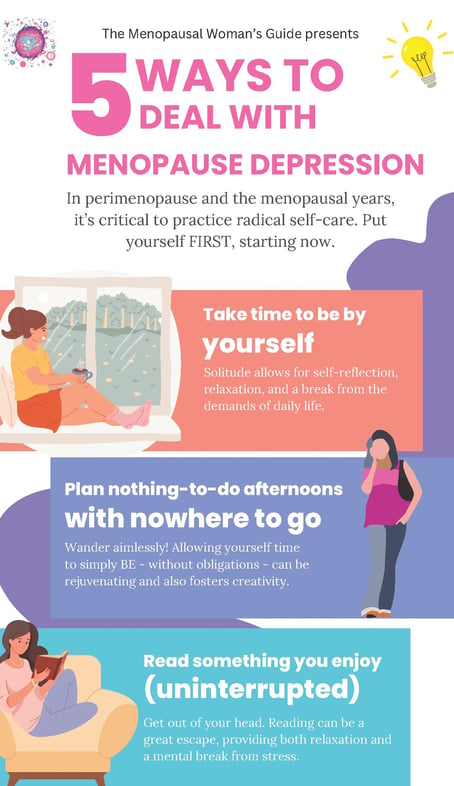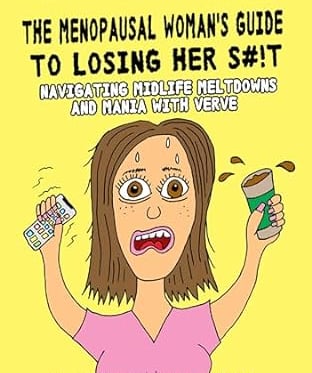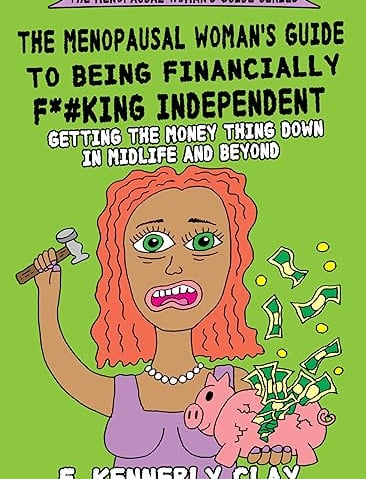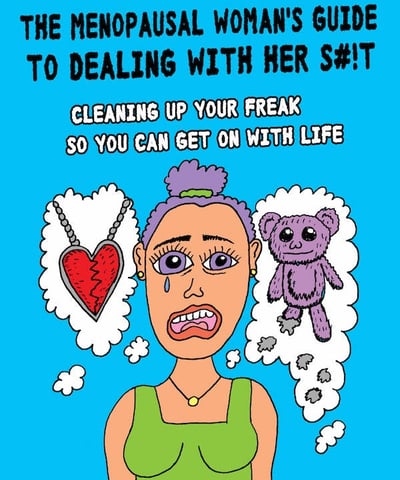
Treating Menopause Depression
From therapy and antidepressants to psychedelic medicine and good old fashioned fun, treating menopause depression comes in many forms. Find out what works.
How to treat depression caused by menopause
So, you’re dealing with "the menopause"—those godforsaken hot flashes, the bitchiness beyond anything you've ever known, and now the shadow of depression. Seriously? As if you need one more thing in your life to make you fucking crazy.
Whether you're just starting to experience depression symptoms in menopause or you've been riding the wild wave for some time, it's important to seek out treatment, techniques, and hyper self-care at this time. I can't promise you it'll be easy, but I can share from my own experience - from the depths of despair to the light of day - this too will most probably pass.
Depression in menopause: WTF is going on?
Dealing with menopause and mental health on top of it is probably not what you signed up for. But chances are, there's a whole shitstorm of symptoms taking over your mind and body, which can trigger depression in some women, especially those with a history of mental health issues.
Hormones gone haywire
First things first: Let’s talk hormones. Menopause isn’t just about saying goodbye to your period; it’s also about your hormones deciding to throw a wild party and then abruptly leaving you to clean up the mess. Estrogen, in particular, is a key player in this nonsense. As estrogen levels drop, your mood can take a nosedive, making you feeling completely sucker-punched by life.
Brain chemistry and mood
But wait, there’s more! It’s not just about hormones either. Your brain chemistry is also in on this bullshit. Serotonin, the feel-good neurotransmitter, can be affected by those plummeting estrogen levels, leading to feelings of sadness and despair. It’s a perfect storm of hormonal and chemical upheaval that can make you feel like you’re losing your mind.
Life stressors (aka shitshow)
As if the hormonal rollercoaster wasn’t enough, menopause often coincides with major life changes—empty nests, aging parents, and career shifts, to name a few. These stressors can exacerbate feelings of depression, the constant overwhelm sucking the life and the joy right out of you. Good fucking times.
If you or someone you know is in crisis, please call 988, the Suicide & Crisis Lifeline in the United States.
Recognizing the signs of menopause depression
Mood swings vs. depression
Mood swings are par for the course in menopause, but how do you know if what you’re experiencing is actual depression? The key is persistence and severity. If you’re feeling down more often than not, losing interest in activities you used to love, and struggling with feelings of hopelessness, it might be more than just a bad day.
Physical symptoms (yup, for real)
Depression isn’t just about feeling sad—it can also manifest in physical ways. Fatigue, changes in appetite, sleep disturbances, and even aches and pains can all be signs of depression. If you’re feeling like a sad old zombie, it’s worth considering whether menopause might be the culprit.
5 ways to deal with menopause depression
Get the infographic on the importance of self-care in menopause and five creative ways to deal with menopause depression.


Menopause depression treatment options
You'll have to be highly proactive about your own mental health in menopause. Be vocal with your healthcare providers, including your OB-GYN, and be open to trying different treatment approaches to discover what works for you. Keep in mind, what works for the time-being may not work next year. Eventually, you'll find your own imperfect path to peace of mind in menopause.
Hormone therapy to balance the scales
For many women, hormone replacement therapy (HRT) is the first line of defense against menopause-related depression. By replenishing your body’s estrogen levels, HRT can help stabilize your mood and alleviate depressive symptoms. There are several forms of hormone therapy, including pills, patches, and creams. Talk to your doctor to find the best fit for you.
I found bio-identical hormone replacement therapy (BHRT) to be my salvation in the early perimenopausal years. I worked with a functional and integrative MD who helped determine (through a full hormone and metabolic panel) that my body was depleted of free testosterone - that hormone that gives you drive and motivation, energy and clarity. Everybody needs it (not just men), and I had none. I started having BHRT pellets inserted in alternating butt cheeks once every three to four months. Within days I felt a spring in my step and the fog in my brain, lifting. If you're curious about BHRT, do your research and also seek out a functional and/or integrative MD with expertise in menopause.
Antidepressants to regulate brain chemistry
In some cases, antidepressant medication might be necessary to manage menopause depression. Selective serotonin reuptake inhibitors (SSRIs) and serotonin-norepinephrine reuptake inhibitors (SNRIs) are commonly prescribed to help boost your mood. These medications can help regulate brain chemistry and alleviate symptoms of depression. I don't think I could've done any part of perimenopause or post-menopause without Mother's Little Helpers. Prozac, Wellbutrin and Gabapentin were my constant cocktail for a number of years. Now I'm down to a small dose of Wellbutrin daily. It boosts energy as well as mood - and these two are intertwined, for me. Work with your healthcare provider to determine the best medication and dosage for your needs.
Therapy for life
Sometimes, the best medicine is a good chat. Therapy can be incredibly effective in managing menopause depression. Cognitive-behavioral therapy (CBT), interpersonal therapy (IPT), and other forms of counseling can help you develop coping strategies, challenge negative thought patterns, and navigate the emotional ups and downs of menopause. A therapist can provide a safe space to explore your feelings and work through the challenges you’re facing.
Keep in mind, menopause and midlife can be turbulent times. If you haven't dealt with past-based bullshit in your life, now is a great time to take yourself on. Therapy can help.
Watch ‘Menopause Depression Nearly Killed Me’: Lynsey's Life-Changing HRT Journey | This Morning
"The Menopausal Rating Scale (MRS) is an 11-item, 5-point Likert scale that assesses for somatic, urogenital, and mood symptoms in women experiencing the menopausal transition. Scores range from 0 to 44, with higher scores indicating greater symptom severity."
- Journal of the American Academy of PAs
Menopause depression treatment starts with you
Self-care first
In the midst of menopause madness, self-care often takes a backseat. But prioritizing your well-being is crucial. Whether it’s indulging in a bubble bath, going for a leisurely walk, or curling up with a good book, make time for activities that nourish your soul and replenish your spirit. Remember, you can’t pour from an empty cup - and chances are, your cup is dry as a fucking bone.
Physical activity however small
Exercise is one of the most effective ways to combat depression. Physical activity releases endorphins—those feel-good chemicals that can help lift your mood. Whether it’s a brisk walk, a yoga class, or a dance party in your living room, find an activity you enjoy and make it a regular part of your routine.
Nourishing mind and body
What you eat can have a significant impact on your mood. A balanced diet rich in fruits, vegetables, whole grains, lean proteins, and healthy fats can help stabilize your blood sugar levels and support overall well-being. Avoid excessive caffeine and sugar, which can lead to energy crashes and mood swings.
Don't get me wrong. It's not easy to eat healthfully in menopause when you're experiencing gnawing hunger fueled by rage, hormonal hot flashes, insomnia and more. But you can start by implementing one or two healthy behaviors now, whether it's an extra glass of water every day or cutting back on carbs and sugar.
Sleep to stay sane
Sleep disturbances are common during menopause and can exacerbate feelings of depression. Establish a regular sleep routine, create a calming bedtime environment, and avoid screens before bed. Okay, okay, let's not lie to ourselves. Who here is avoiding screens before bed? In fact, every night, I've got a screen of some sort close by, lulling me off to sleep. If you're using a phone, tablet, or television to dull your senses into slumber, consider opting for a narrated story before bedtime or even a lengthy sleep meditation If you’re struggling with insomnia, talk to your doctor about potential solutions.
Keep in mind, menopause and midlife can be turbulent times. If you haven't dealt with past-based bullshit in your life, now is a great time to take yourself on. Therapy can help.
Exploring alternative treatments for menopause depression


Finding your menopausal zen with meditation
Mindfulness and meditation can be powerful tools in managing menopause depression. These practices can help you stay present, reduce stress, and develop a greater sense of self-awareness. Whether it’s through guided meditation, deep breathing exercises, or simply taking a few moments each day to be still, incorporating mindfulness into your routine can have profound benefits.
Acupuncture for menopausal depression
Acupuncture, an ancient Chinese medicine practice, involves inserting thin needles into specific points on the body to balance energy flow. Some studies suggest that acupuncture can help alleviate symptoms of depression by promoting the release of endorphins and improving overall energy balance.
Menopausal mood and herbal remedies
Herbal remedies have been used for centuries to treat various ailments, including depression. St. John’s Wort, black cohosh, and ginkgo biloba are just a few examples of herbs that may help alleviate menopausal symptoms, including depression. However, it’s important to consult with a healthcare professional before starting any herbal supplements, as they can interact with other medications and have potential side effects.
Yoga, Pilates, tai chi
Both yoga and tai chi combine physical movement with mindfulness, creating a practice that benefits both body and mind. These activities can help reduce stress, improve flexibility and strength, and promote a sense of calm. Plus, they’re gentle on the body, making them ideal for women in various stages of menopause. My personal preference has been Pilates. I love the stretching and core work. I also love that Pilates doesn't make me sweat (I hate fucking sweating). Find what works for you. Keep it light, not too demanding. Just something that gets you in motion a wee bit.
Marijuana and psychedelic medicine for depression in menopause
No doubt you've heard about CBD and other forms of medical marijuana for depression, but is it for you? Some women find that CBD can be helpful in managing symptoms of menopause depression, but be sure to talk with a healthcare professional you trust to explore the idea. You may be a good candidate for alternative treatments like this. Curious about ketamine for depression? I've written about my own experience with existential depression in menopause and my quest for a cure when talk therapy and antidepressants alone weren't making a difference. Ketamine therapy for depression is a burgeoning treatment that's helping many with treatment-resistant depression. Again, do your research and decide whether it's right for you. Keep in mind, when you work with a ketamine clinician (I went through Mindbloom.com for in-home treatments), you'll be overseen by a professional who will first assess your mental and physical health and history to determine whether you might benefit from this type of treatment.
Your menopause support network
The power of connection
Navigating menopause can feel isolating, but you don’t have to go it alone. Building a strong support network can make a world of difference. Whether it’s friends, family, or a menopause support group, having people to talk to who understand what you’re going through can provide emotional relief and practical advice. Support groups, both in-person and online, offer a safe space to share experiences, ask questions, and receive support from others who are in the same boat. These groups can provide a sense of community and remind you that you’re not alone in your journey.
Communicating with loved ones
Talking to your partner, family, and friends about what you’re going through can help them understand your experience and offer the support you need. Be open about your feelings and let them know how they can help. Sometimes, just having someone listen can make a big difference. It can also be helpful to explain why you've been stark raving mad and raging at the Universe. My constant refrain throughout this time period has been: "Don't fuck with me, I'm a menopausal woman."
Medical interventions for menopause depression
Knowing when to see a doctor
If you’re experiencing persistent symptoms of depression that are affecting your daily life, it’s important to seek professional help. Your doctor can help determine the best course of action, whether it’s medication, therapy, or a combination of treatments.
Finding the right healthcare provider
Finding a healthcare provider who understands menopause and its impact on mental health is crucial. Look for a doctor who is knowledgeable about menopause treatments and willing to work with you to find the best solutions for your needs. Don’t be afraid to seek a second opinion if you feel your concerns aren’t being addressed.
In talking to dozens of women in and approaching menopause, I hear the constant refrain: My doctor doesn't get it. Or doesn't offer much guidance. Or isn't up on various treatment options. This is common. It's not a slight to doctors, necessarily, but it does go to show that you might be talking to the wrong doctor - at least about this. I feel like I really on my primary care doctor to keep me on track with basic health stuff, but anything about perimenopause and menopause I would take that to my functional and integrative MD or my weight management doctor or even my therapist.
Oh, that's another thing: This is the time in your life where you start having a bunch of doctors on your team.
Monitoring your progress
Once you’ve started treatment, it’s important to monitor your progress and adjust your plan as needed. Keep track of your symptoms, any side effects, and how you’re feeling overall. Regular check-ins with your healthcare provider can help ensure that you’re on the right track and make any necessary adjustments.
Holistic ways to cope with menopause depression
Aromatherapy for chilling out
Aromatherapy uses essential oils to promote relaxation and well-being. Scents like lavender, chamomile, and bergamot can help reduce stress and improve mood. You can use essential oils in a diffuser, add them to a bath, or apply them topically (diluted with a carrier oil) for a calming effect.
Every morning, I light a scented candle in the living room. It's a peaceful, relaxing ritual that also scents the air, promoting calm-the-fuck-downedness.
Massage therapy for pain and stress relief
Massage therapy can help reduce stress, relieve muscle tension, and promote relaxation. Regular massages can also improve circulation and boost endorphin levels, helping to alleviate symptoms of depression. Treat yourself to a professional massage or ask a partner to give you a soothing rubdown.
If you feel like you can't afford a massage, find out if there's someone who does foot reflexology near you. Having just your feet and calves massaged, intentionally, can produce overall calming and pain relief throughout your body.
Creative outlets for self-expression
Engaging in creative activities like painting, writing, or playing music can provide an emotional outlet and help reduce stress. Creativity allows you to express your feelings in a non-verbal way, offering a therapeutic release and a sense of accomplishment.
Every morning, I light a scented candle in the living room. It's a peaceful, relaxing ritual that also scents the air, promoting calm-the-fuck-downedness.
Finding empowerment in menopause
Adjust your perspective
Menopause is often viewed as a negative experience, but it can also be seen as a time of transformation and growth. Most women I've talked to (and I've talked to many) find this arrival at the give-no-fucks era can be particularly liberating. Embracing this changing time in your life can help you find empowerment and a renewed sense of self. Focus on the positives, like the freedom from monthly periods and the wisdom that comes with age. Discover the things you really want to do in life and start doing them. Do less of what you don't.
Be kind to yourself
It’s easy to be hard on yourself when you’re struggling with depression, but practicing self-compassion is crucial. Treat yourself with the same kindness and understanding that you would offer to a friend. Acknowledge your feelings without judgment and remind yourself that it’s okay to ask for help, even if you just need someone to listen to you vent and rant. Truth is, we don't always want our problems solved. We just want someone who can get who we are and what we're dealing with.
Find joy in small moments
Finding joy in everyday moments can help lift your spirits and combat depression. Whether it’s savoring a cup of coffee, enjoying a beautiful sunset, or spending time with loved ones, focus on the little things that bring you happiness. Cultivating gratitude can also help shift your mindset and improve your overall outlook on life.
We don't always want our problems solved. We just want someone who can get us and what we're dealing with.
Everyday strategies for managing menopause depression
Staying organized
Depression can make it difficult to stay organized and on top of daily tasks. Creating a routine and using tools like planners and to-do lists can help you manage your responsibilities and reduce stress. Break tasks into smaller, manageable steps and celebrate your accomplishments, no matter how small. Cut back on shit that's overwhelming. Do less. "Be" more.
When I was in the early perimenopausal years, experiencing menopausal depression symptoms like extreme fatigue, brain fog, and wild mood swings, I felt like I could barely think straight let alone put one foot in front of another. It became clear to me that doing all the things I used to do - deftly - was no longer possible. I could not hold myself to such high expectations for getting shit done, being involved in shit, or meeting other people's accountability of me. That shit had to end for the sake of my sanity.
Recognize your limitations and be at ease with the way things are becoming. Do everything you can to conserve your time, energy, mental focus and peace of mind.
Setting boundaries
Setting boundaries is essential for protecting your mental health and conserving your energy. Learn to say no to things that drain your energy and prioritize activities that nourish your well-being. Communicate your needs clearly to others and don’t be afraid to enforce your boundaries.
This time in your life is all about YOU. It's about you and it's for you. If you've spent the last decade (or more) putting others first, you might start experiencing the profound impact of always going with the flow or not giving yourself permission to indulge yourself because of time or money. Fuck that shit. It's time to draw some lines in the sand. Put yourself first. Stop putting up with shit you're tired of putting up with. Communicate (loudly) what you need, what you don't need, and what you will and will not tolerate anymore.
Now, start living!
Practicing being present
Mindfulness is the practice of staying present in the moment without judgment. Incorporating mindfulness into your daily routine can help reduce stress and improve your mood. Simple practices like mindful breathing, meditation, and grounding exercises can help you stay centered and focused.
Being present or even wanting to be in the moment can be particularly challenging when you're in the depths of menopausal depression. I understand. I wanted to be anywhere, at any other period of time, other than the one I was wallowing in for weeks, months, and even years. I begged (the Universe) for things to be over, for this to pass, for me to survive it all. When it feels so unbearable, why on earth would we want to be present for it?
Part of being present has to do with giving up future-tripping, existential angst, and the intrusive thoughts of "things will always be like this" - all of which take us out of being in the present moment and contribute to feelings of anxiety and depression. Finding ways to be in this particular moment without concern for what's in the past or the future can be profoundly therapeutic in menopause.
Laughing at the absurdity
Laughter truly is one of the best medicines for depression. Watch a funny movie or stand-up comedian, read funny shit, and spend time with people who make you laugh your head off. Laughter releases endorphins and can help shift your perspective, even if just for a moment.
Being willing to allow yourself to laugh is a good sign. And when you do find yourself laughing, notice that you've just found humor or delight in something, which is a clear indication that you are still capable of experiencing some joy in life.
Reclaiming your joy in the face of menopause
Treating depression in menopause is a multifaceted journey that may involve a combination of medical treatments, lifestyle changes, and support systems. By exploring hormone therapy, antidepressant medication, talk therapy, and holistic approaches, you may be able to find the right balance to alleviate your symptoms and reclaim your joy.
Remember: You’re bound to lose your shit, but you’re likely to get it back again at some point.
Books for women who are losing it in menopause
Mental Health
Losing your mind in peri/menopause?
The menopausal woman's guide series
Financial Health
Had enough of financial insanity?
Personal Growth
Triggers? Old stuff kicking up?
Related topics
Explore helpful articles, tips, and advice for women who are losing their shit in menopause.
Community
Stay Connected
© 2024. Eclectic Content, Inc. All rights reserved.






